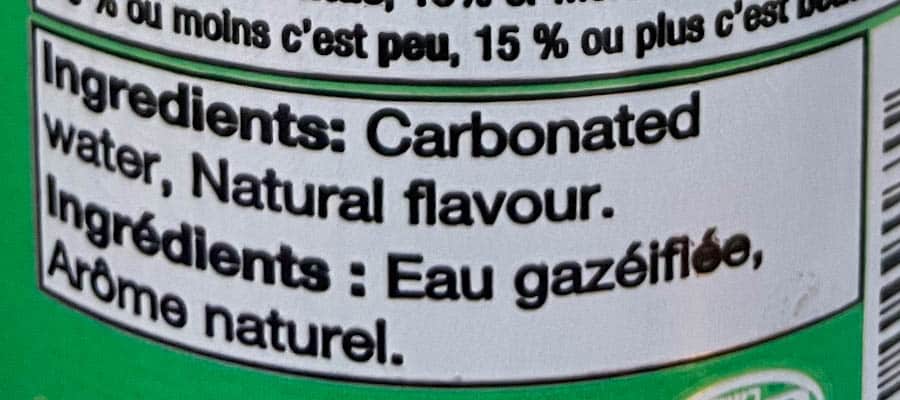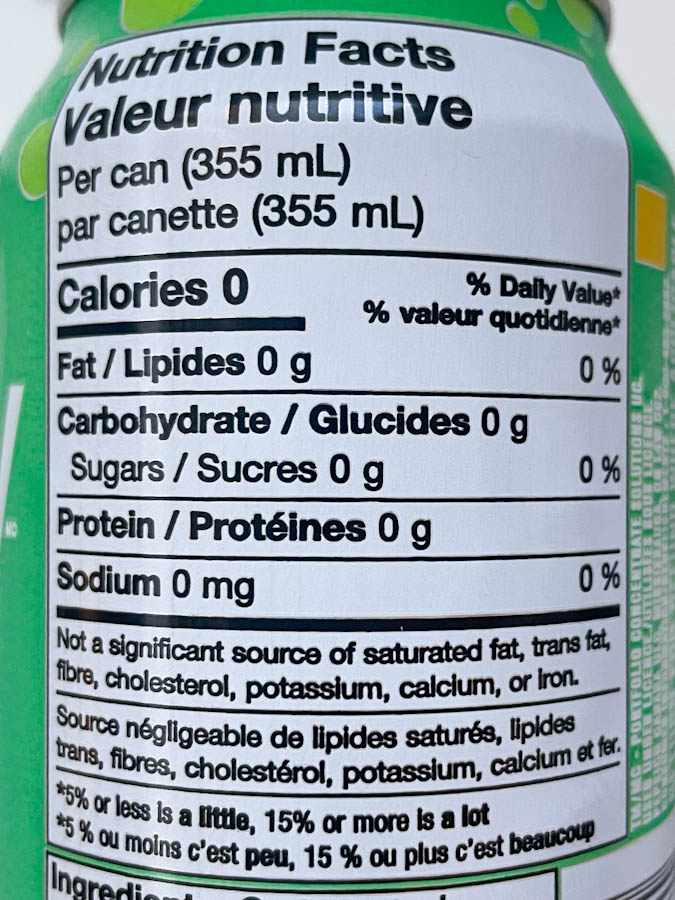Sugar-free flavored carbonated drinks have become popular over the past few years, but is Bubly Sparkling Water Good For You? Our expert dietitian reviews the nutrition and ingredient content to help you make an informed choice at the grocery store. Continue reading for everything you need to know about Bubly sparkling water.
About Bubly
Bubly is a flavored sparkling water beverage with zero sugar, zero sweeteners, and zero calories. It comes in many flavors, including grapefruit, lime, cherry, peach, blackberry, orange, mango, watermelon, strawberry, and raspberry.
Taste & Texture
Bubly has a fizzy texture and a subtle sweet flavor.

Bubly Ingredients
Carbonated Water: made by adding carbon dioxide gas to water under pressure, causing bubbles to form.
Natural flavor: natural flavors are added to flavor each Bubly variety. ‘Natural flavor’ is a blanket term that includes any extract from a plant or animal food. This may be as simple as lime juice or could be several different essences or oils extracted from fruit to produce flavor. To read more about natural flavors, check out our post What are Natural Flavours and Should You Avoid Them? for everything you need to know.
Bubly Nutrition Facts
Based on one 355ml can of Bubly.
Calories: 0
Fat: 0g
Carbohydrates: 0g
Sugar: 0g
Protein: 0g
Sodium: 0mg

Is Bubly Sparkling Water as Hydrating as Water?
In clinical practice, all fluid sources will help contribute to hydration status – soup, tea, juice, high-water foods, etc. But is carbonated water as effective as water for hydration? One study investigating the potential of different beverages on hydration status found that when corrected for actual water content, water and sparkling water had very similar hydration capacities, both ranking at a 1 on their hydration scale (5).
Chronic Disease Prevention
Traditional soft drink consumption is linked to an increase in overweight, obesity, and diabetes worldwide (1). The American Heart Association conducted a review of the cardiometabolic effects of low-calorie sweetened beverages. They concluded that sugar-free carbonated beverages can help reduce sugar intake, which has a beneficial effect on chronic disease risk compared to traditional soda. They also noted that while soda containing non-sugar sweeteners such as aspartame can help reduce sugar intake, consuming unsweetened alternatives such as carbonated water or plain water is ideal (2).
Is Sparkling Water Bad for Your Teeth?
Carbonated beverages such as traditional soft drinks have long been associated with negatively affecting oral health, but what about sugar-free varieties such as Bubly Sparkling water? One study investigating the effect of various beverages on tooth enamel found that flavored carbonated water beverages produce significantly more erosion to enamel compared to plain water. Researchers attributed the effects on enamel to the carbonated beverages being more acidic than plain water. Compared to traditional soda, however, sugar-free carbonated water produced less erosion to the enamel (4).
Is Bubly Sparkling Water Good For You?
Bottomline: Bubly is an excellent choice for those seeking an alternative beverage to traditional soda, or other sweetened beverages. Bubly is hydrating and can help people meet their daily fluid needs without using sweetened drinks. However, Bubly should not be treated as a replacement for water as it may damage tooth enamel if consumed frequently. Aim to meet most of your daily fluid needs with water and enjoy unsweetened carbonated drinks such as Bubly in moderation.

Related Posts
- Are Quest Bars Healthy? Dietitian Review
- What Are Tocopherols? Ingredient 101
- Is Vector Cereal Healthy? Dietitian Review
Sources
- Basu S, McKee M, Galea G, Stuckler D. Relationship of soft drink consumption to global overweight, obesity, and diabetes: a cross-national analysis of 75 countries. Am J Public Health. 2013 Nov;103(11):2071-7. doi: 10.2105/AJPH.2012.300974.
- Johnson RK, Lichtenstein AH, Anderson CAM, Carson JA, Després JP, Hu FB, Kris-Etherton PM, Otten JJ, Towfighi A, Wylie-Rosett J; American Heart Association Nutrition Committee of the Council on Lifestyle and Cardiometabolic Health; Council on Cardiovascular and Stroke Nursing; Council on Clinical Cardiology; Council on Quality of Care and Outcomes Research; and Stroke Council. Low-Calorie Sweetened Beverages and Cardiometabolic Health: A Science Advisory From the American Heart Association. Circulation. 2018 Aug 28;138(9):e126-e140. doi: 10.1161/CIR.0000000000000569.
- Inchingolo AM, Malcangi G, Ferrante L, Del Vecchio G, Viapiano F, Mancini A, Inchingolo F, Inchingolo AD, Di Venere D, Dipalma G, Patano A. Damage from Carbonated Soft Drinks on Enamel: A Systematic Review. Nutrients. 2023 Apr 6;15(7):1785. doi: 10.3390/nu15071785.
- Eckhart, Scott & Brewster, John & Curtis, Denice. (2022). The erosive potential of sugar-free waters on cervical dentin. JADA Foundational Science. 1. 100009. 10.1016/j.jfscie.2022.100009.
- Maughan RJ, Watson P, Cordery PA, Walsh NP, Oliver SJ, Dolci A, Rodriguez-Sanchez N, Galloway SD. A randomized trial to assess the potential of different beverages to affect hydration status: development of a beverage hydration index. Am J Clin Nutr. 2016 Mar;103(3):717-23. doi: 10.3945/ajcn.115.114769.


